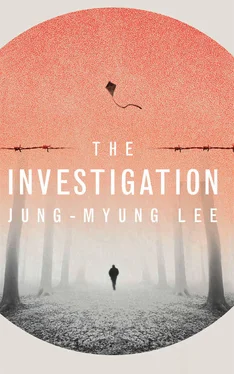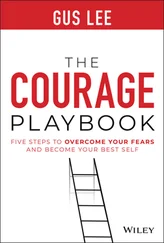Mother was lonely and I was withdrawn, but we weren’t unhappy. That fortress of books was our refuge. I discovered this only a long time later, but it was also the price of my father’s life, what he’d given us when he walked into the war zone in Manchuria. I might have been a little less sad if I’d never known that. But the timing of everything is always off. Man is in pain because he finds love too early, because he hasn’t seen someone for too long and because he discovers the truth too late.
I SEE THE BACK OF A SAD MAN WALKING ALONE UNDER A METEOR
The next morning, Maeda greeted me in his office with a smile. He poured me a cup of tea. ‘What have you discovered?’
My voice as hard as a log, I answered that I didn’t have anything special to report.
He fiddled with the brim of his cap. ‘No, it won’t be easy for a young student-soldier like you. But make it your business and see it to the end.’
I took out the piece of paper from my inner pocket and unfolded it. ‘I discovered this note in the dead guard’s pocket. There’s a mysterious verse written on one side of it.’
Maeda looked at me, then at the note I placed on his desk. He laughed. ‘Of course. You can’t get rid of your habits that easily. He couldn’t help himself.’
My curiosity was piqued.
‘Sugiyama Dozan was a bookworm, but he was like a lost dog among the sentences.’ Maeda smiled slyly. ‘He was also the censor of Ward Three.’
The role of censor sounded important, but I knew that all he had to do was sit in a back room. When I was in Ward Four the censor there was an old guard. It was a position given to him out of respect because he found it difficult to manage the prisoners. He sat in his small office and dozed all day, reading letters. How could a top-notch guard like Sugiyama have been the censor?
‘Ward Three is a separate entity within the prison,’ Maeda explained, noting my surprise. ‘The most evil criminals are kept there. Compared to these Koreans, the prisoners you’re used to in Ward Four are gentlemen. To inspect their correspondence, the censor has to be just as vicious and unmerciful. Sugiyama was not just an excellent guard, he was also the best censor in the prison.’
‘But he seemed not to care for words. ’ I said, unbelieving.
‘Quite. Since he was new to reading and writing, he could be an excellent censor.’
‘How?’
The water boiling on the stove melded with his voice. Maeda cleared his throat. ‘When those Koreans poured into Ward Three, we found that we needed a different censorship method, because they think differently from us Japanese. First we banned all correspondence not written in Japanese. So, to inspect their Japanese, we wanted someone new to literacy. A novice would read and write the language the same way as Koreans who aren’t used to Japanese. So he would be able to pinpoint suspicious expressions.’
‘So Sugiyama was the perfect man.’
‘He’d never even crossed the threshold of an elementary school, but his capabilities of comprehension and learning were amazing. Instead of reading like a normal person, he instinctively zeroed in on forbidden words and expressions. His eyes caught every expression with an ambiguous meaning.’ Maeda shook his head in awe.
I knew that censorship was essential. After we bombed Pearl Harbor, the war had intensified and daily life had grown more chaotic. Thugs and subversives, armed with knives and petrol, roamed the streets. All anti-Japanese Koreans were arrested, but subversive activities continued. The delusion of independence floated hazily over the streets and universities of Tokyo, infecting other Koreans. Every time a Korean political offender was arrested, all their writings, books and documents, including personal promissory notes, were confiscated to disarm them of vicious ideas. Upon sentencing, the boxes of confiscated documents and a list of their contents accompanied the prisoners into prison.
Maeda explained that Sugiyama was given special orders to act as censor for Ward Three; consequently he had to learn to read and write. Sugiyama protested at first; he despised literacy. To him, writing was merely a tool with which to corrupt the world, applying various — isms to set fire to the hearts of the weak and prey upon them. But in the end he was a soldier; orders weren’t for him to understand, they were to be followed. He began his education by writing down words he didn’t know on a sheet of paper. The inspection office was a makeshift structure at one end of Ward Three and was once used as an interrogation and execution room until a large-scale execution area was built, complete with gallows and a place for fusillades. Sugiyama spent all day in that office, studying diligently like a silkworm gnawing through green mulberry leaves. That office was his solitary battlefield, his enemy the Korean prisoners — Communists hell-bent on destruction, terrorists eager to assassinate high-ranking officials, anarchists trying to overthrow the government, thieves, robbers and swindlers. Sugiyama pawed through papers, ferreting out seditious meanings from each phrase and sniffing out forbidden expressions. No suspicious phrase ever got past his prying eyes. He sorted boxes of confiscated material, assigned them unique numbers, organized them in the storage area and incinerated them. His red pen slashed the page. He paid no heed to the use of a word, the length of a sentence, the strength or weakness of an expression; if it didn’t fit his strict standards, he marked it with his red stamp: To Be Incinerated .
Sugiyama had come home alive from the war zone. For seven years and three months he’d experienced trench warfare in the rain, gun battles in snow-covered fields, sieges and bayonet fights in the heavy darkness. But according to Maeda, Sugiyama considered this silent war in his quiet office the most valuable of them all. Books and records marched forward like enemy soldiers, and within them he found the enemy that gnawed through our healthy empire like a swarm of moths. He would look up when he noticed the setting sun dyeing the small westward window red, only to leap back into the world of paper and ink. When he raised his eyes again, it would be dawn. Only then would he rest. When day broke he moved the seditious books and letters he had uncovered to the new incinerator that had been built in the empty lot next to the inspection office. Watching the flames quietly swallow the forbidden documents, Sugiyama would feel relief, as though he were burning a rebel village or executing a traitor.
Maeda paused and rifled through his pockets. He pulled out a lighter, shining in his heavy palm, and lit a cigarette. ‘This was Sugiyama’s. Take it. You’ll need it.’ He took a deep drag. ‘Without Sugiyama, there’s nobody to act as censor. There’s already a backlog. For the time being, you’re it.’ He flicked white ash from the tip of his cigarette.
I was horrified. I felt like Abraham having to kill his own son. ‘There are well-qualified guards with more experience than I. And I don’t know what censorship entails.’
‘As far as I’m aware, you’re the right man. You have skills they don’t have.’
‘What are they?’
‘I looked at your records. You were not only a liberal-arts student, but you’d won a prize in the Emperor’s national essay contest. You can find subversive ideas between the lines.’
I understood what Maeda wasn’t saying. There was a hierarchy in the world of guards; exchanges and vigilant competition, surveillance and jealousy, plots and conspiracies helped a guard rise through the ranks. Nobody wanted to sit in a back room like an old man and flip through prisoners’ letters all day. Maeda was boosting my ego to force me to do work nobody else wanted to do. But I didn’t want this, either. I tightened my grip on the lighter. ‘But I’m supposed to settle Sugiyama’s affairs and investigate his death.’
Читать дальше












